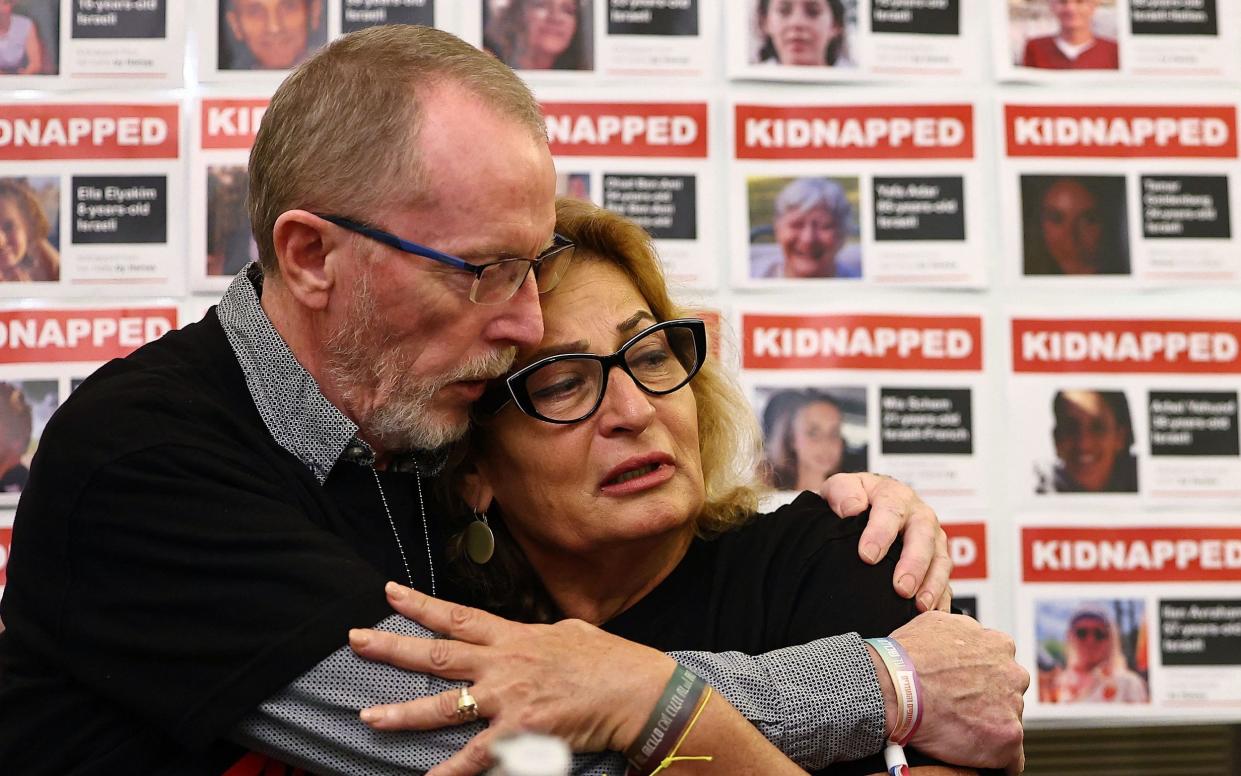Families of hostages in agonising wait ahead of Israel-Hamas ceasefire

Families of hostages are enduring an agonising wait to discover if their loved-ones will be released on Thursday as part of Israel’s ceasefire deal with Hamas.
Ten to 13 hostages will be handed over on each of the next four days under the terms of the agreement, with children expected to be prioritised.
A nine-year-old Irish girl was yesterday reported to be among those in line to be released, as was an American three-year-old who was orphaned in the Oct 7 massacre.
They are two of 39 children believed to be held in Gaza. Hamas claims it is only holding 30 children, and says it has not been able to locate additional hostages who were captured by rival factions such as Islamic Jihad.
Hopes were kindled on Tuesday evening after an Israeli TV reporter read out live on air a purported government list of 50 hostages, predominantly women and children, expected to be released this week.
However, the Israeli prime minister’s office later denied any knowledge of such a list. Government sources said Hamas may only disclose the identities of those they plan to free each day at the time of them being released, or shortly before.
Children first
Emily Hand, an Irish-Israeli nine-year-old, was nevertheless hoped to be one of those freed.
Earlier in the week her father Thomas Hand gave an emotional press conference in which he said: “Every day she must be asking why daddy hasn’t come to save her.”
Meanwhile the US-based family of three-year-old Abigail Mor Eden appeared hopeful that she would be home “within the next couple of days”.
The toddler’s parents were murdered by terrorists when they overran the kibbutz of Kfar Aza. Her two siblings hid for 14 hours before being rescued.
It is understood that the Israeli government expects children who were kidnapped along with their mothers to be released alongside their parents, although analysts have suggested that Hamas has not agreed to this.
It was reported that soldiers specially trained in children’s welfare will be deployed to greet the returning child hostages.
Israel’s Haaretz newspaper said that one soldier would be assigned to each child or family, to ask if they were cold, hungry or thirsty, emphasise that they were safe and only touch them with their express permission.
A legal challenge from families of Israeli victims of Palestinian violence yesterday failed in a legal challenge to block the hostage release deal.
The Almagor association had claimed that the Government’s decision intensified the risk of “the recurrence of serious acts of terrorism to which all the citizens and residents of the country are exposed”.
The Court said it rejected the petition outright on the grounds that the hostage deal was a “political issue”.
‘All we have to do is pray”
Meanwhile, in Tel Aviv, families spoke of a harrowing roller coaster of emotions, with some hitting out at a lack of information from the Government.
Relatives of Amit Soussana, who was abducted from the kibbutz of Kfar Aza, said they had only learnt about the details of the deal from watching the news.
Her mother said she did not believe her daughter, whom Hamas terrorists dragged out of a closet, would be among the first to go free because she is a single woman.
Her sister, Shira, said: “It’s a nightmare. We don’t know what will happen next. All we have to do is pray.”
Neither Israel nor Hamas has provided an official list of the 240 hostages thought to be held in Gaza.
The Israeli authorities have notified some of the relatives of those being held, while others who believe friends or family members are among the hostages have not been officially informed.
Thirty-nine of the hostages identified are 18 years old or younger. A baby boy called Kfir Bib, who is less than a year old, is believed to be the youngest.
Yesterday, activists with yellow ribbons, that became a symbol of the hostages’ families’ movement, gathered in the area of Tel Aviv that has become known as Hostages Plaza. A religious group set the table for every individual being held by Hamas, putting flour on each plate for the ritual of baking challah.
‘I’m not going to believe it until it happens’
Shemi Kalderon, whose nephew Ofer together with his 16-year-old daughter and 12-year-old son were abducted from the kibbutz of Nir Oz, was rallying outside the Israel Defense Forces’ headquarters with the pictures of his relatives on Wednesday night.
“This is a roller coaster that has been going on for too long,” Mr Kalderon said.
“Of course, it gives us some hope that [the] kids will come back. But I’m not going to believe it until it actually happens.”
The deal caused profound soul-searching in Israel, as many feared that the ceasefire, whether it holds for four days or longer, could derail the operation to eradicate Hamas.
Israel has said the truce could be extended as long as an additional 10 hostages were freed per day.
However, Mr Kalderon, who served 40 years in the Israeli armed forces, said taking a pause in fighting for the sake of releasing at least some of the hostages was the right thing to do.
“I know the army inside out,” he said. “I’m sure they can pick up where they left off. They’re already in Gaza. There’s no going back.”

